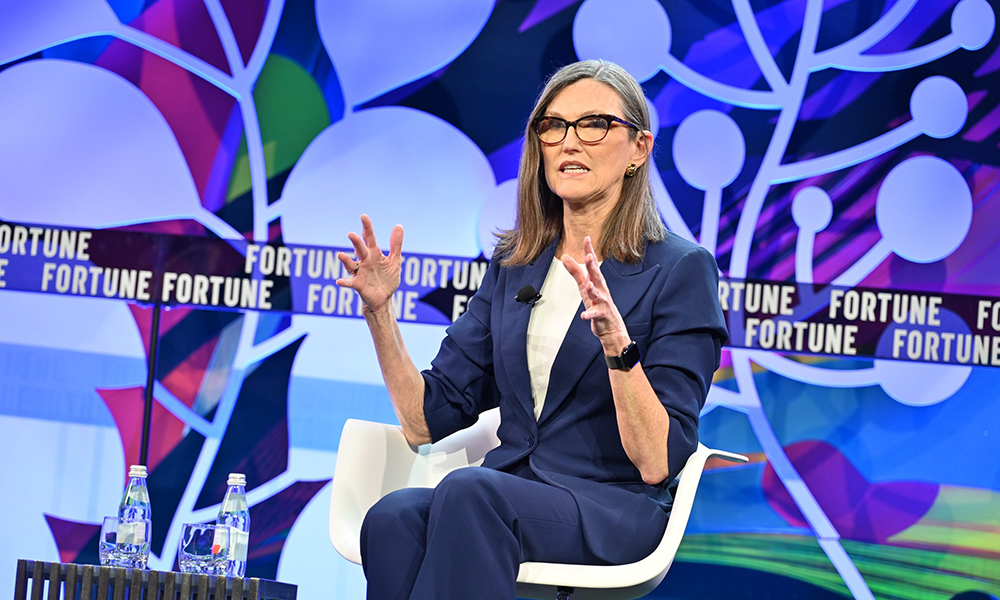
方舟投资(ARK Invest)的创始人及首席执行官凯西·伍德让人津津乐道的是,她以大手笔而且经常冒风险,投资“颠覆性”科技公司。从特斯拉(Tesla)到Zoom,她投资了许多全世界最成功、增强潜力最大的公司,并且大获成功。但在过去几年,她最看好的许多投资对象,因为美联储(Federal Reserve)为抑制通胀不断加息的举措而受到了影响。简而言之,借款成本上涨严重冲击了伍德信赖的许多未实现盈利的科技股。但她表示,好消息是,无论对她的基金还是整体经济来说,痛苦即将结束。
不久前,华尔街最担心的是“恶性”通胀。华尔街认为,由于劳动力市场紧张、根深蒂固的通胀预期甚至人口结构的变化,迫使美联储为了实现2%的通胀目标,不得不“长期维持更高利率”,因此消费物价可能维持在4%至5%左右。
但伍德从来不认同所谓恶性通胀的说法。她曾经多次指出,技术创新将开启一个生产率提升和物价下降的新时代,她同时批评美联储官员通过加息破坏经济(并影响她的基金的业绩)毫无必要。因此,上周超出预期的通胀报告震惊华尔街之后,伍德才会说她一点都不意外,而且消费者应该为通货紧缩做好准备。这份最新的通胀报告出炉后,美国股市暴涨。
伍德于11月14日在接受《华尔街日报》(Wall Street Journal)采访时表示:“更大的风险是通货紧缩,而不是通货膨胀。我们会看到越来越多通货紧缩的迹象。实际上,我认为投资者担心的对象是错误的。”
伍德认为机票、汽车和大宗商品价格下降,证明各经济部门正在从通货膨胀转向通货紧缩。衡量大宗商品期货价格的广义指标道琼斯大宗商品指数(Dow Jones Commodity Index),在过去12个月下跌超过7%,较2022年3月的最高点下跌了21%,证明了她的观点。11月14日的消费物价指数(CPI)报告显示,10月,尽管有美国汽车工人联合会(United Auto Workers)罢工,但新车和二手车价格却有所下降,而机票价格同比下降了13.2%。
伍德上周在接受彭博社(Bloomberg)采访时表示,她之所以认为美国经济目前出现了通货紧缩的迹象,理由是美联储为控制通胀持续加息超过20个月,这是过度反应。
她说:“我认为美联储的反应过度。未来我们会看到更多通货紧缩的迹象。如果明年某个时间点CPI出现负增长,我也不会感到意外。”
越来越多人预测通货紧缩
虽然伍德一直以大胆的主张和预测而著称,例如,她认为到2027年,特斯拉的股价将上涨到每股2,000美元,三年后比特币(Bitcoin)的价格将达到150万美元,但并非只有她预测通货紧缩。
11月16日,零售业巨头沃尔玛(Walmart)的首席执行官董明伦(Doug McMillon)在第三季度业绩电话会议上称,干杂货和消耗品价格“在未来几周和几个月将开始下降”,从而引发美国经济更大范围的通货紧缩趋势。
他告诉分析师:“美国可能在未来几个月经历一段时期的通货紧缩。”他还表示,“很高兴看到这种趋势”。
家得宝(Home Depot)的管理团队在11月14日召开的第三季度业绩电话会议上也发表了类似的观点。该公司的首席财务官理查德·麦克费尔说:“我认为我们最重要的观察结果是,最严重的通货膨胀环境已经结束。”他还指出,“零售物价正在回落”。
通货紧缩拯救方舟投资?
方舟投资的伍德在上周表示,她对最近出现的通货紧缩趋势感到高兴,这应该能够令她持有的科技股和其他成长股受益。
伍德的旗舰基金方舟创新ETF(ARK Innovation ETF)在新冠疫情的第一年期间大获成功,但现在较2021年1月的最高点下跌了70%。美联储激进加息、借款成本飙升以及在国债和债券市场面向零售投资者的另类投资选择的崛起,对方舟投资以成长股为主的投资组合造成了沉重打击。
在方舟投资绩效不佳的过去几年,伍德经常批评美联储。她认为,美联储官员在加息速度和幅度方面犯了“严重错误”,造成了美国经济的动荡,影响了她的公司的策略。
但这位华尔街资深投资者在上周称,目前方舟投资“处于非常有利的地位”,可以抓住经济趋势转向的机会。关于她的基金持有的“颠覆性”科技股,她对《华尔街日报》表示:“科技会降低通胀。因此它们知道如何在通货紧缩的环境中运行。”(财富中文网)
译者:刘进龙
审校:汪皓
方舟投资(ARK Invest)的创始人及首席执行官凯西·伍德让人津津乐道的是,她以大手笔而且经常冒风险,投资“颠覆性”科技公司。从特斯拉(Tesla)到Zoom,她投资了许多全世界最成功、增强潜力最大的公司,并且大获成功。但在过去几年,她最看好的许多投资对象,因为美联储(Federal Reserve)为抑制通胀不断加息的举措而受到了影响。简而言之,借款成本上涨严重冲击了伍德信赖的许多未实现盈利的科技股。但她表示,好消息是,无论对她的基金还是整体经济来说,痛苦即将结束。
不久前,华尔街最担心的是“恶性”通胀。华尔街认为,由于劳动力市场紧张、根深蒂固的通胀预期甚至人口结构的变化,迫使美联储为了实现2%的通胀目标,不得不“长期维持更高利率”,因此消费物价可能维持在4%至5%左右。
但伍德从来不认同所谓恶性通胀的说法。她曾经多次指出,技术创新将开启一个生产率提升和物价下降的新时代,她同时批评美联储官员通过加息破坏经济(并影响她的基金的业绩)毫无必要。因此,上周超出预期的通胀报告震惊华尔街之后,伍德才会说她一点都不意外,而且消费者应该为通货紧缩做好准备。这份最新的通胀报告出炉后,美国股市暴涨。
伍德于11月14日在接受《华尔街日报》(Wall Street Journal)采访时表示:“更大的风险是通货紧缩,而不是通货膨胀。我们会看到越来越多通货紧缩的迹象。实际上,我认为投资者担心的对象是错误的。”
伍德认为机票、汽车和大宗商品价格下降,证明各经济部门正在从通货膨胀转向通货紧缩。衡量大宗商品期货价格的广义指标道琼斯大宗商品指数(Dow Jones Commodity Index),在过去12个月下跌超过7%,较2022年3月的最高点下跌了21%,证明了她的观点。11月14日的消费物价指数(CPI)报告显示,10月,尽管有美国汽车工人联合会(United Auto Workers)罢工,但新车和二手车价格却有所下降,而机票价格同比下降了13.2%。
伍德上周在接受彭博社(Bloomberg)采访时表示,她之所以认为美国经济目前出现了通货紧缩的迹象,理由是美联储为控制通胀持续加息超过20个月,这是过度反应。
她说:“我认为美联储的反应过度。未来我们会看到更多通货紧缩的迹象。如果明年某个时间点CPI出现负增长,我也不会感到意外。”
越来越多人预测通货紧缩
虽然伍德一直以大胆的主张和预测而著称,例如,她认为到2027年,特斯拉的股价将上涨到每股2,000美元,三年后比特币(Bitcoin)的价格将达到150万美元,但并非只有她预测通货紧缩。
11月16日,零售业巨头沃尔玛(Walmart)的首席执行官董明伦(Doug McMillon)在第三季度业绩电话会议上称,干杂货和消耗品价格“在未来几周和几个月将开始下降”,从而引发美国经济更大范围的通货紧缩趋势。
他告诉分析师:“美国可能在未来几个月经历一段时期的通货紧缩。”他还表示,“很高兴看到这种趋势”。
家得宝(Home Depot)的管理团队在11月14日召开的第三季度业绩电话会议上也发表了类似的观点。该公司的首席财务官理查德·麦克费尔说:“我认为我们最重要的观察结果是,最严重的通货膨胀环境已经结束。”他还指出,“零售物价正在回落”。
通货紧缩拯救方舟投资?
方舟投资的伍德在上周表示,她对最近出现的通货紧缩趋势感到高兴,这应该能够令她持有的科技股和其他成长股受益。
伍德的旗舰基金方舟创新ETF(ARK Innovation ETF)在新冠疫情的第一年期间大获成功,但现在较2021年1月的最高点下跌了70%。美联储激进加息、借款成本飙升以及在国债和债券市场面向零售投资者的另类投资选择的崛起,对方舟投资以成长股为主的投资组合造成了沉重打击。
在方舟投资绩效不佳的过去几年,伍德经常批评美联储。她认为,美联储官员在加息速度和幅度方面犯了“严重错误”,造成了美国经济的动荡,影响了她的公司的策略。
但这位华尔街资深投资者在上周称,目前方舟投资“处于非常有利的地位”,可以抓住经济趋势转向的机会。关于她的基金持有的“颠覆性”科技股,她对《华尔街日报》表示:“科技会降低通胀。因此它们知道如何在通货紧缩的环境中运行。”(财富中文网)
译者:刘进龙
审校:汪皓
Cathie Wood, ARK Invest’s founder and CEO, is known for her big—and often risky—bets on “disruptive” technology companies. From Tesla to Zoom, she’s taken chances on some of the most high-flying, growth-focused companies on the planet—and had several big wins along the way. Over the past few years, though, many of her favorite picks have been vulnerable to rising interest rates as the Federal Reserve has moved to rein in inflation. Simply put, rising borrowing costs have crippled many of the unprofitable tech stocks that Wood relies on. But the good news is the pain may be coming to an end, she says—both for her fund and for the economy.
Not long ago, Wall Street’s biggest fear was “sticky” inflation. The idea was that consumer price increases might stagnate around 4% to 5% due to the tight labor market, entrenched inflation expectations, or even demographics, forcing Federal Reserve officials to keep interest rates “higher for longer” in order to achieve their 2% target inflation rate.
But Wood never bought the sticky inflation argument. She’s repeatedly made the case that technological innovation will lead to an era of rising productivity and falling prices while criticizing Fed officials for unnecessarily crippling the economy (and clipping her fund’s wings) with rate hikes. That’s why after the latest cooler-than-expected inflation report shocked Wall Street last week, leading stocks to surge, Wood said she wasn’t surprised at all—and consumers should expect deflation from here on out.
“The bigger risk here is deflation, not inflation. And we’re seeing more and more signs of it,” Wood told the Wall Street Journal in a November 14 interview. “I actually think that investors are worrying about the wrong thing.”
Wood points to fading airfare, car, and commodity prices as evidence that inflation is turning to deflation across the economy. To her point, the Dow Jones Commodity Index, a broad measure of commodity futures prices, is down more than 7% over the last 12 months, and 21% since its March 2022 peak. And November 14’s consumer price index (CPI) report showed that despite the United Auto Workers’ strike, both new and used car prices declined in October, while airfare prices sank 13.2% year-over-year.
In a separate interview with Bloomberg last week, Wood argued that the reason deflation is now appearing in the economy is that the Fed has gone too far with its more than 20-month-long interest rate hiking campaign meant to tame inflation.
“I think the Fed’s overdone it. I think we’re going to see a lot more deflation going forward,” she said. “I would not be surprised to see CPI going negative at some point next year.”
Mounting deflation calls
While Wood is known for making bold claims and predictions—including arguing Tesla stock will surge to $2,000 per share by 2027 and Bitcoin will hit $1.5 million just three years later—she’s not alone when it comes to forecasting deflation.
Walmart CEO Doug McMillon said on the retail giant’s third quarter earnings call on November 16 that dry grocery and consumables prices may “start to deflate in the coming weeks and months,” leading to a broader deflationary trend in the economy.
“In the U.S., we may be moving through a period of deflation in the months to come,” he told analysts, adding that he’s “happy about it.”
Home Depot’s management team sang a similar tune in their third quarter earnings call on November 14 as well. “I think the most important observation we’ve made is that the worst of the inflationary environment is behind us,” CFO Richard McPhail said, adding that “retail prices are settling in the market.”
A deflationary savior for a leaking ARK?
ARK Invest’s Wood said last week that she is pleased with the recent deflationary trend, which should benefit her portfolio of tech and other growth-focused stocks.
After an incredible run of success during the first year of the pandemic, Wood’s flagship fund, the ARK Innovation ETF, has dropped 70% from its January 2021 peak. Amid the Fed’s aggressive interest rate hikes, soaring borrowing costs and the rise of alternative investment options for the retail crowd in Treasuries and Bonds have hit ARK Invest’s growth focused holdings hard.
Wood has often criticized the central bank in the past few years of underperformance at ARK Invest, arguing that officials made a “serious mistake” with the pace and size of their rate hikes, creating an “earthquake” for the economy—and her firm’s strategy.
But the veteran Wall Street investor said this week that ARK Invest is now “in a very good place” to take advantage of the shifting tides in the economy. “Technology is deflationary. And so they know how to operate in a deflationary world,” she told the Wall Street Journal of her funds’ “disruptive” tech holdings.






